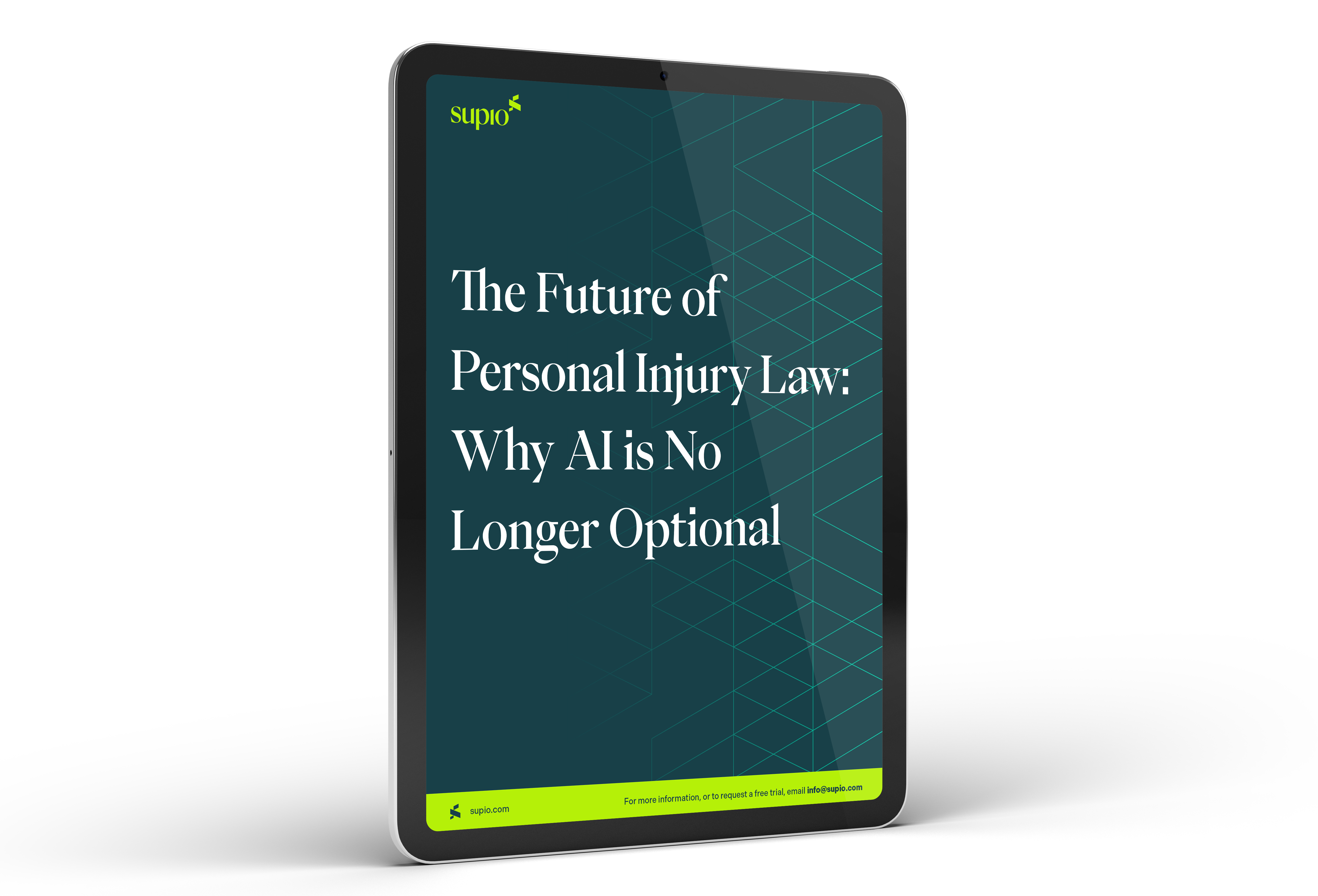
The Future of Personal Injury Law: Why AI is No Longer Optional
Artificial intelligence (AI) is no longer a futuristic concept for the legal profession; it’s a transformative force reshaping how attorneys approach their work. For personal injury law in particular, where the stakes are high and cases rely heavily on data, the adoption of AI is proving to be a game-changer. This article explores how AI tools like Supio are leading this transformation, why adoption is accelerating, and what the future holds for legal professionals ready to embrace innovation.
The Current Landscape of AI in Law
AI adoption in the legal profession is experiencing a rapid uptick, with reports signaling a seismic shift in how law firms operate. According to the 2024 LexisNexis Investing in Legal Innovation Survey, over half of AmLaw 200 firms (53%) have purchased at least one generative AI (Gen AI) solution, and 45% are already using these tools for legal matters. Furthermore, 77% of senior lawyers believe that Gen AI will allow them to offer new value-added services to clients, highlighting the increasing demand for innovative legal solutions.
The Clio Legal Trends Report for 2024 echoes this trend, reporting a dramatic increase in AI adoption among legal professionals from 19% in 2023 to 79% in 2024. These statistics underscore the growing realization that AI is not just a tool but a necessity for competitive practice in today’s legal landscape.
This shift is particularly significant for personal injury attorneys, who often face time-consuming tasks like reviewing medical records, finding case critical insights, and preparing demand letters. By embracing AI, these professionals can improve efficiency while delivering better client outcomes.
The Benefits of AI: More Than Just Efficiency
Saving Time and Increasing Productivity
One of AI’s most significant advantages is its ability to streamline repetitive tasks. The Future of Professionals Report predicts that AI could save legal professionals hours per day. For U.S. lawyers alone, the report estimates 266 million hours of increased productivity annually. These time savings enable attorneys to focus on higher-value activities, such as client advocacy, taking on more cases, and strategic planning.
Enhancing Accuracy
In personal injury law, cases often hinge on the ability to sift through vast medical records and bills, depositions, and case records like police reports. AI tools like Supio ensure greater accuracy by:
- Turning your case data into actionable intelligence with a searchable, filterable, and organized medical chronology, reducing the risk of missed diagnoses or treatment gaps.
- Comparing, contrasting, or detecting inconsistencies in case records like witness testimonies and expert reports.
- Providing detailed financial analyses, including case economics and settlement intelligence in a transparent and easily understandable format.
Offering Strategic Insights
AI doesn’t just streamline tasks—it also enhances strategic decision-making. According to a recent LexisNexis study, 73% of firms use AI to gain competitive insights on opposing counsel, parties, and judges. This capability is particularly valuable in personal injury cases, where understanding the opposition can significantly impact outcomes.
Additionally, AI offers predictive analytics to forecast case outcomes based on historical data. These insights allow attorneys to weigh risks more effectively and present stronger arguments in negotiations and court proceedings.
Overcoming Barriers to AI Adoption
Despite its advantages, AI adoption in the legal industry has faced hurdles. The 2023 ABA Legal Technology Survey Report revealed that over half of respondents (58.8%) were either unaware of AI-based tools or lacked sufficient knowledge to evaluate their potential. This lack of awareness has been a significant barrier to widespread adoption, compounded by the traditionally cautious nature of the legal profession.
However, the tides are turning. As demonstrated by the dramatic rise in AI usage from 19% in 2023 to 79% in 2024, the industry is moving past its initial skepticism. Firms that were once hesitant now recognize that failing to adopt AI could leave them at a competitive disadvantage.
Education and awareness campaigns are critical to bridging the knowledge gap. AI adoption will accelerate even further as more firms share success stories and measurable results.
Supio: Leading the Charge in Personal Injury Law
Supio is at the forefront of AI innovation, offering tools specifically designed to address the unique challenges of personal injury law. Here’s how Supio is transforming case strategies:
Medical Chronologies and Timelines
Supio automates the creation of medical chronologies, turning hours of manual work into minutes. These interactive, searchable timelines link directly to source documents, ensuring accuracy and accessibility. Attorneys can focus on analyzing critical information rather than compiling data. Supio also provides case signals within these timelines to note when you are missing a record or medical bill. Case injuries can be analyzed further with a high degree of accuracy on whether or not the injury was related to your case or could have been from a previous injury.
Data-Driven Insights
Supio’s AI chatbot provides case critical insights that can provide further value for your case by scanning medical records and other case documents to identify missed diagnoses, untreated symptoms, or inconsistencies in treatment. By uncovering these details, attorneys can build stronger cases and maximize client compensation.
Legal Document Outputs
From demand letters to depositions, Supio provides standard legal outputs like demand letters or plaintiff fact sheets for mass torts. But for instant needs, legal professionals can use dynamic drafting to create their own outputs like motions, briefs, complaints, and responses. For documents like demand letters, if a legal professional has a change they need to update or they want to change the tone to be more assertive, they can do this in real-time with the AI assistant, without back-and-forth communications with 3rd party vendors. This reduces turnaround times, allowing attorneys to allocate more time to case strategy and client engagement.
Financial Analysis
Supio’s case economics feature simplifies reviewing billing data, liens, and settlement projections. Legal professionals can receive a comprehensive and accurate ledger for easy review and analysis that includes ICD codes, medical descriptions, payments, adjustments, and insurance payments. Attorneys can generate clear, comprehensive financial summaries to support negotiations and give clients transparent insights into their cases.
Real-World Applications
Supio has already significantly impacted high-stakes personal injury cases. For example, attorneys have used Supio to identify treatment gaps that increased settlement values and to prepare comprehensive demand letters that strengthened their negotiation positions.
Supio supported TorHoerman Law, which recently represented a plaintiff in a bellwether case brought against Abbott Labs. Supio supported TorHoerman attorneys with real-time case insights to help them win. The case resulted in the healthcare company being ordered to pay $495 million in compensatory and punitive damages.
These real-world applications demonstrate how AI can drive meaningful results for law firms and their clients.
A Look Ahead: The Future of AI in Personal Injury Law
As AI adoption grows, its applications in personal injury law will only expand. The 2024 LexisNexis Survey found that 92% of respondents plan to increase their use of AI for legal analytics in the next year. For Supio, the future is already here. Its AI is currently capable of the following, or making tremendous strides in these areas:
- Predictive Analytics: Using AI to forecast case outcomes based on historical data.
- Enhanced Collaboration: AI tools that integrate seamlessly with case management systems for real-time updates and shared insights.
- Personalized Client Services: Soon, tools will also leverage AI to provide clients with tailored updates and transparent progress reports.
Firms that embrace these advancements will stay competitive and set new standards for excellence in the legal profession. As AI tools like Supio evolve, they will unlock new opportunities for efficiency, accuracy, and client engagement.
Why AI is No Longer Optional
The legal industry is at a crossroads. Firms that resist AI risk falling behind, while those that embrace it stand to gain a significant edge. AI is not just a tool for efficiency—it’s a catalyst for innovation, enabling attorneys to deliver better client results while navigating an increasingly complex legal landscape.
Supio exemplifies the transformative power of AI, offering personal injury attorneys the tools they need to succeed in today’s fast-paced environment. Whether automating repetitive tasks, uncovering critical insights, or enhancing client trust, Supio is helping firms redefine what’s possible.
Ready to see how Supio can transform your practice? Schedule a demo today and take the first step toward the future of personal injury law.



